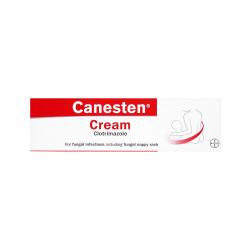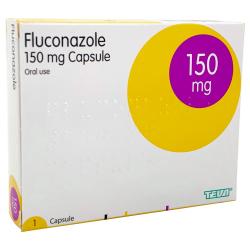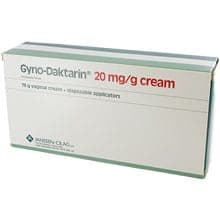Login to your account
- Prescription included
- Genuine medication
- All-inclusive service - No hidden fees
- Free next-day delivery
Thrush
Get thrush medication with an online prescription
Thrush is a fungal infection that can cause uncomfortable symptoms. Thankfully, there are effective treatments and prevention methods to alleviate itching and pain, as well as clearing the infection completely. Vaginal thrush is an extremely common yeast infection that affects nearly 75% of women. Thrush in men is less common, however this can still occur and treatments provided at euroClinix.
Though it is not necessarily dangerous, the infection can cause discomfort and should be treated as soon as possible. Although the infection can appear after sex, and it is possible to transfer thrush to your partner, it is not classified as a sexually transmitted infection (STI). Clinically proven antifungal medications Diflucan and Gyno-Daktarin are available online at euroClinix for the treatment of thrush and can be purchased after completing a confidential and free consultation.
Available Treatment(s)

- Effectively treats fungal infections
- Easy to apply
- Soothes irritated and itchy skin

- Highly effective against thrush
- Broad-spectrum antifungal treatment
- Single-dose treatment for genital thrush
What is thrush?
Thrush is a condition caused by a yeast infection also known as Candida albicans, candida or vulvovaginal candidiasis. It can affect men, however the vast majority of people who experience thrush are women.
Vaginal thrush is a very common condition and can be recurrent, especially if there are certain triggers or you have a long-term health condition. Approximately three-quarters of women in the UK will suffer from at least one yeast infection in their lives. Up to half of these women will experience a recurrence of this condition. It is most commonly women in their twenties and thirties who develop this condition, and can be provoked after sex although it is not a sexually transmitted infection.
Yeast infections in men are uncommon, however can occur from time to time. It can be caused by several reasons and is categorised into three types of candida infections; Candida balanitis (infection of the penis), oropharyngeal candidiasis (oral thrush) and candida skin infection.
Oral thrush
Thrush can also manifest itself in other parts of the body. It can occur in the mouth, throat or oesophagus, a condition known as oral thrush or oral candidiasis. It is a very common infection in those with compromised immune systems because of certain medical conditions, as well as in infants and older adults. Particularly in oral thrush, dry mouth, smoking, poor oral hygiene and poorly fitting dentures can also increase your risk of developing oral thrush.
Oral thrush can be treated with Diflucan capsules, but there are different topical treatments available for direct relief of painful symptoms, such as nystatin mouthwash or oral gels.
Skin infection
Thrush can also affect the skin, particularly in the armpits, groin or between the fingers. This is because the fungi thrive in warm and moist areas, which means folds of skin are the biggest targets for fungal skin infections. People with candidiasis of the skin will typically have a rash or itching in a particular area. New mothers can also get skin candidiasis from breastfeeding if their baby has oral thrush. This is because the skin around the breast and nipples can become infected with candidiasis from contact with the baby’s mouth.
What causes thrush?
Vaginal thrush is caused by a family of fungi known as Candida. Most cases of thrush are caused by Candida albicans, but other species of Candida such as Candida glabrata and Candida tropicalis can also result in thrush. These fungi usually live harmlessly in the vagina and cause no symptoms. This is because the natural or ‘good’ bacteria in the vagina alongside our immune system maintain the balance of the fungus. In fact, the delicate balance of bacteria and fungus makes up the vaginal flora (microbiome), and helps keep your vagina healthy.
However, when there is an overgrowth of the candida fungus, this balance is disrupted, and a vaginal thrush will present itself. For this reason, although it can develop after and spread through sexual intercourse, yeast infection is not classified as a sexually transmitted infection.
Who is more at risk of developing thrush?
Most women will experience a vaginal yeast infection in their lifetime, and often can develop for no obvious reason. However, there are certain risk factors that mean you are more susceptible to developing thrush. This is most often when your immune system is compromised by certain circumstances or your naturally occurring bacteria cannot inhibit fungal growth.
You may be more at risk if you are:
- taking a course of antibiotics
- using certain contraceptives such as the combined contraceptive pill, patch or ring - all alter hormone levels and can sometimes result in yeast overgrowth
- undergoing chemotherapy
- taking a high-dose of corticosteroids
- menstruating
- pregnant
- diabetic
- immunocompromised - have a condition that causes you to have a weaker immune system, such as HIV/AIDS
Hygiene factors can also influence your likelihood of getting vaginal thrush. Frequently, wearing tight clothes or non-absorbent underwear can reduce airflow and cause excess moisture. In addition, strongly scented bath or shower products and feminine hygiene products (such as douching) all disrupt the balance of bacteria in the vagina, allowing for fungal overgrowth. These are often marketed to clean the vagina but they often do the opposite, and they should be avoided.
Over time, you will understand what triggers a yeast infection, whether this is a lifestyle choice that could be easily adjusted or preparing for a bout of thrush if it's unavoidable and recurrent. This means the number of yeast infections you experience could be prevented in the future.
What are the symptoms of thrush?
As the fungus only presents itself after it has begun to multiply, it's possible to be infected without knowing. If this is the case, the only way to establish whether an infection is present is to get tested. However, this is often unnecessary as many women can either tell if they have thrush or wait for symptoms to appear before treating it, as it is not a dangerous condition.
Symptoms in women can cause discomfort inside of the vagina but symptoms are more visible in the exterior of the vagina (the vulva). This can include:
- itching and soreness (especially around the vulva)
- irritation around the genital area
- noticeably red vagina and vulva
- odourless white vaginal discharge, often described as cottage cheese
- mild pain while urinating or during sex
Men experience similar symptoms, including:
- irritation, burning and redness around the head of the penis and under the foreskin
- an unpleasant smell
- difficulty pulling back the foreskin
Thrush can be difficult to diagnose, especially as there are several urogenital conditions such as bacterial vaginosis, cystitis and STIs that can cause similar symptoms. If you are experiencing any of these symptoms for the first time or you are not sure what the cause could be, it’s best to speak to a healthcare professional.
What is the difference between thrush and bacterial vaginosis?
Bacterial vaginosis (BV) is a bacterial infection that is similar to thrush in that it is caused by an imbalance of microbes in the vagina. Thrush and BV are often confused for one another, however, there are ways to tell them apart. The key indicator of what type of infection you have is in the appearance and odour of vaginal discharge. BV causes grey or watery discharge that has a strong odour, whilst thrush causes an odourless thick white discharge.
It can be difficult to tell the difference, so it’s important that you seek medical advice if you’re not sure. Doctors can perform swab tests of the discharge, similar to cervical smear tests or pap smears, to find out what infection is causing it. Alternatively, there are pH tests that can be purchased over the counter at pharmacies that help distinguish between the two conditions. It can be an effective way to find out for yourself so that you can get treatment quickly.
What are the symptoms of oral thrush or skin infection?
The most characteristic symptom of oral thrush are white lesions on your tongue and inner cheeks. In more severe cases, the infection can spread to the roof of the mouth, gums, tonsils or the back of your throat. These lesions can be sore and uncomfortable, resulting in difficulty swallowing.
Candida infections of the skin can cause scaly skin, redness, itching and blisters or pustules in the most severe cases. Skin candidiasis can look like other fungal infections such as ringworm or athlete’s foot, but topical or oral treatment is usually the same for most skin infections.
How do I treat thrush?
Thrush treatments vary between over-the-counter creams and pessaries to prescription-only medications. Depending on the severity of the thrush infection, a doctor may recommend a treatment based on what they judge to be the appropriate method that will provide the best results. Over time, you will be the best judge on which antifungal medicines work for you.
Over-the-counter medications
There are treatment options available at pharmacies that can help to ease your symptoms. These come as both oral and topical antifungals. The main antifungal available for vaginal thrush in pharmacies is clotrimazole. It can be used for several other fungal infections, such as athlete’s foot and fungal nail, so it comes in many forms, including sprays, gels and liquid solutions.
For the treatment of vaginal thrush, clotrimazole comes as pessaries and creams. There are two types of antifungal cream available. Treatments listed as ‘external creams’ work best for any external itching or irritation (in the vulva). If you feel any internal itching or discomfort, you may need an ‘internal cream’. Alternatively, you can get vaginal pessaries. Pessaries come with a thin plastic tube (an applicator) that allows you to easily and comfortably insert the medication into the vagina. The tablet you would have placed onto the end is then inserted and the tube removed. Topical antifungals allow you to apply the medication directly to the affected area for quick relief of irritation.
Prescription medication
For more severe or recurrent symptoms, prescription treatments may be more effective. Here at euroClinix we offer two antifungal treatments for vaginal thrush.
We offer a treatment called Diflucan. It contains 150 mg of the active ingredient fluconazole, which works by killing the fungus and preventing them from reproducing. Fluconazole is available over-the-counter for the treatment, however you are only able to buy one dose. At euroClinix, you can buy up to 3 doses for more complicated cases of thrush.
We also offer a cream called Gyno-Daktarin, which contains the antifungal miconazole. It is meant to be taken twice a day, in which the cream must be applied to an applicator and then inserted into the vagina.
These medications aren’t suitable for everyone. So if you have any other health conditions or take any other medications, it’s important to speak to your GP or healthcare provider.
How can I prevent thrush?
Although a lot of cases of vaginal thrush have no obvious cause, there are things you can do to ease discomfort and prevent thrush returning.
- avoid excessively cleaning the vagina with products that are heavily scented or marketed to clean the vagina (like douching or vaginal deodorants)
- wash with just water and unscented soaps or emollients
- dry properly after washing to limit moisture
- take extra care to stay hygienic whilst menstruating
- avoid sexual intercourse - while thrush is not an STI, it can be passed onto your sexual partner and can sex can increase irritation symptoms
- wear cotton underwear and loose clothing
- take probiotics if you are on a course of antibiotics - they will replace the good bacteria that antibiotics kill in the process of treating a preexisting infection
It’s important to speak to your GP if you experience frequent bouts of thrush, or previous treatments do not work for you. There may be an underlying condition or problem that may need addressing. For instance, recurrent thrush is common in people with diabetes and consistently have high blood sugar. In this case, you might need your diabetes medication reassessed.
How can I prevent oral thrush or other skin infections?
Like vaginal thrush, keeping good hygiene is the best way to prevent Candida infections across the body. Washing and drying thoroughly, especially after exercising or during hot weather is a sure way to prevent infection.
In the case of oral thrush, keeping good oral hygiene helps reduce the risk of infection. This involves regularly rinsing your mouth (especially if you use steroid inhalers for conditions like asthma or COPD), brushing your teeth twice a day and flossing daily. If you wear dentures, you can prevent infection by monitoring your dentures, making sure they fit and that they are clean.
Can I buy thrush treatment online?
At euroClinix, you can buy prescription treatments Diflucan and Gyno-Daktarin for thrush that are clinically proven to ease symptoms and cure yeast infections quickly. All you have to do is fill out a short consultation form that one of our registered UK doctors will review. Once you are suitable for treatment, your order will be dispensed and dispatched discreetly from our pharmacy with free next-day delivery.
Select
medicationFill out a short
medical formDoctor issues
prescriptionMedication sent
from pharmacy

